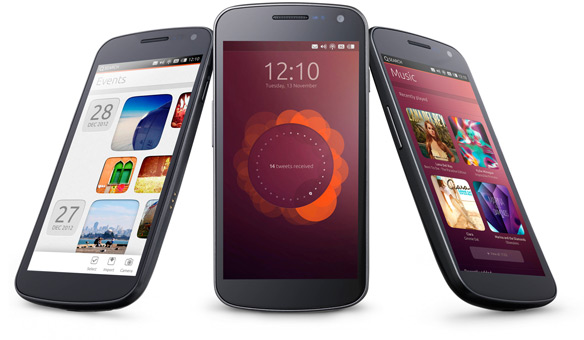I have been an amateur user of Ubuntu Desktop for quite a while and I have always thought it was an amazing operating system. When I saw the activity on twitter I went to check on their website and I found something very sleek, neat and attractive: much like the desktop of course. There are a few "demos" available on YouTube and they display a very modern, elegant and more important, different user interface. An example is here:
I think it may have a niche competing with Android on low end budget SmartPhones and in any SmartPhone that is sold in budget sensitive markets. Manufacturers will look at alternatives to Android for multiple reasons, and one of them will be differentiation. Ubuntu Phone will provide that. It's not the only one offer of course, but it's a very nice one for sure.
There's been some critics about the fact that it is late to market (very possibly), since Android and iOS are dominant, and the battle for the third place is ripe for the taking by Microsoft. More interesting are the critics that say Ubuntu has got it wrong in that they are offering a mobile OS which is also a Desktop OS. The critic goes that Desktop is dead, and we should not try to keep hanging on to the old desktop habits and so on.
The timing is indeed an issue. Looks like the first devices officially available with Ubuntu would not show up before end of 2013 or early 2014 and Canonical has had a poor track when it comes to mobile OS in the past. On the other hand, the battle for the third place is so fragmented that they may still have a chance and quite frankly, it does not look as of today that Windows Phone is making serious inroads.
A Desktop? A Phone? or both ... bad idea?
Ubuntu Phone claims that on high end devices you will be able to use it as a desktop. So the concept is that you can run both Phone Apps and Desktop or Web Apps on it, and you can also dock it and connect it to a screen, keyboard and mouse and use it as a real desktop, with a real (good) desktop interface. So Ubuntu Phone is also Ubuntu Desktop. Microsoft is proposing a bit of the same thing with Windows 8, although so far they have been pushing the concept into the tablet (Surface), not really into the SmartPhones.
Is this a bad idea? Is this hanging off to a forgotten past? ... I think not. I believe the Desktop isn't dead. I have an iPad, and an iPhone, and I haven't stopped using my MacBook. Real work gets done on a desktop. When you need to spend time building or working on complex spreadsheets, or writing a content rich document, or a presentation, or programming ... you want a Desktop. ... or ... do you? Well. I think you need a Desktop and by this I mean a comfortable place, a nice (big) screen, mouse and/or trackpad and a proper (comfortable) keyboard. Where the applications run on is less important ...
And this is where I think that Ubuntu Phone got it right. There are two other niche markets where Ubuntu may grow. One is the geek power users who already use Ubuntu Desktop. The other is, potentially, anybody who sees the benefit of having their Desktop with them all the time. I do not see why not. I'd love to have my MacBook inside my iPhone, so that when I am in a place to work, I can dock it and work on it ... Sure, today's high end Smart Phones aren't as powerful as a desktop/laptop computer, but think in two, three years they may be powerful enough.
In fact, today they may be already ... for you can have a thin client on them and then off load the heavy work to a virtualized OS which runs where there's power for it. For enterprises, this is good.
Time will tell ... but for now, I like what I see. I can't wait to get my hands on it even if it's running on a VM only. Probably the main reason why I like is because it is different. Unlike Google's Android, they did not just went on to copy Apple's user interface as a means to penetrate the market and then slowly tweak it to claim it's different and show up some "innovation". No. They created something new, something different. Well done.
